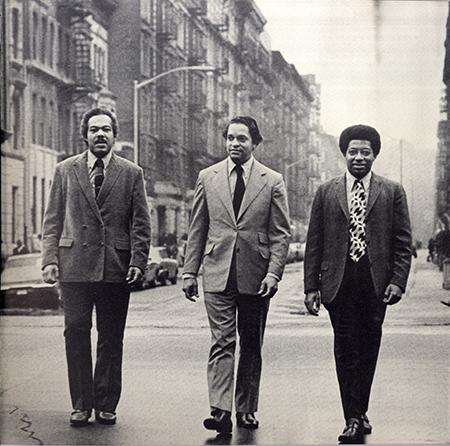
J. Max Bond Jr. (left) with architects Donald Ryder and Nathan Smith, ca. 1969.
The Bernard and Anne Spitzer School of Architecture’s J. Max Bond Center for Urban Futures and the New York-based firm Davis Brody Bond (DBB) announce the formation of a research partnership focused on equitable design practices and urban research.
DBB and the Bond Center, which was established in 2012, both represent the legacy and celebrated career of DBB partner, J. Max Bond, Jr., FAIA (1935 – 2009), who worked tirelessly for social and spatial justice. Regarded as American’s most prominent and accomplished African American architect, Bond, was also architecture dean at The City College of New York. He possessed an acute sense of justice and was regarded as a strategic and committed activist, illustrated throughout his career and most notably with ARCH, the Architect’s Renewal Committee of Harlem, of which he served as executive director in 1967-1968.
The partnership will couple resources from DBB, an award-winning, experienced leader in the architecture and urban design industry that was established in 1952, with the public service, urban research capacity of the Bond Center’s diverse faculty of researchers and student staff. A focus on projects of unique public interest addressing social and spatial equity, inclusion, community sustainability and resilience will provide an expanded context for industry-based and academic research.
“This partnership serves as a pivotal model, illustrating how industry and academic programs and centers with aligned interests can work together to catalyze change at a time when real world problems are outpacing solutions,” said Shawn L. Rickenbacker, director, J. Max Bond Center for Urban Futures and associate professor of architecture at the Spitzer School.
Concurrently, the partnership will structure a unique pipeline for the development of scalable urban and architectural design innovation and solutions to meet growing public need. The partnership promises to contribute to the knowledge base of the industry, academia, government and communities locally and internationally by expanding upon design processes and public service design through participatory design, data integration and transdisciplinary collaboration. The partnership’s expressed intent is to make the important societal contribution of research and design more diverse, accessible and equitable.
“We are thrilled to celebrate Shawn Rickenbacker’s visionary leadership of the J. Max Bond Center and for sustaining Max’s legacy, and we are immensely grateful to Davis Brody Bond for their partnership in this vital project,” said Bradley Horn, interim dean of the Spitzer School.
“Max Bond believed in taking action and we proudly join forces with the J. Max Bond Center to honor his legacy and the pursuit of social and spatial justice,” said Steven M. Davis, FAIA, Partner, Davis Brody Bond.
For more information, visit the J. Max Bond Center and the Davis Brody Bond websites. To support the J. Max Bond Center’s work and its partnerships, donations can be made to The Foundation for City College, a registered 501c3 organization, designation J. Max Bond Center for Urban Futures here.
About the City College of New York
Since 1847, The City College of New York has provided a high-quality and affordable education to generations of New Yorkers in a wide variety of disciplines. CCNY embraces its position at the forefront of social change. It is ranked #1 by the Harvard-based Opportunity Insights out of 369 selective public colleges in the United States on the overall mobility index. This measure reflects both access and outcomes, representing the likelihood that a student at CCNY can move up two or more income quintiles. In addition, the Center for World University Rankings places CCNY in the top 1.8% of universities worldwide in terms of academic excellence. Labor analytics firm Emsi puts at $1.9 billion CCNY’s annual economic impact on the regional economy (5 boroughs and 5 adjacent counties) and quantifies the “for dollar” return on investment to students, taxpayers and society. At City College, more than 16,000 students pursue undergraduate and graduate degrees in eight schools and divisions, driven by significant funded research, creativity and scholarship. CCNY is as diverse, dynamic and visionary as New York City itself. View CCNY Media Kit.
Ashley Arocho
p: 212.650.6460
e:
aarocho@ccny.cuny.edu
View CCNY Media Kit.